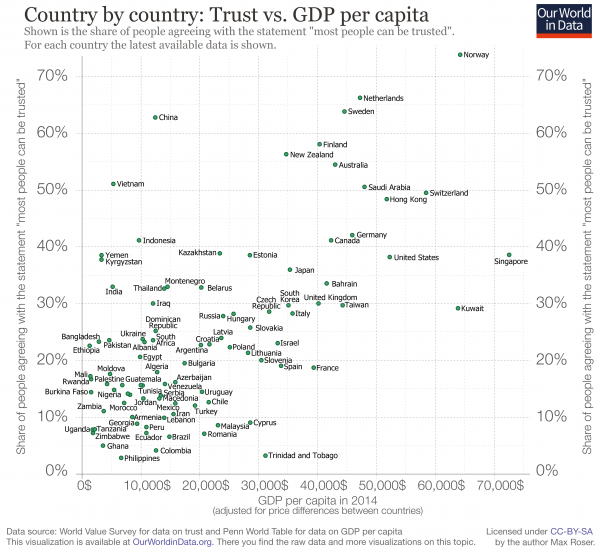[The visualization below and much more on this topic can be found in our entry on Trust]
In a much cited article, Arrow (1972)1 says that “Virtually every commercial transaction has within itself an element of trust, certainly any transaction conducted over a period of time.”
The extent to which trust is linked to economic development has been the subject of many academic papers in the economics literature on growth (see Guiso et al. 20062, Algan and Cahuc 20103, and the references therein). A common way to get a first-order approximation of this relationship is to estimate the correlations between trust and GDP per capita. This visualization provides evidence of this correlation, by plotting trust estimates from the World Value Survey against GDP per capita. Each dot on this scatter-plot corresponds to a different country. You can learn more about measures of national income in our entry on GDP data.
As it can be seen, there is a very strong positive relationship. Most academic studies find that this relationship remains after controlling for further characteristics. And similar results can also be obtained by looking at other measures of economic outcomes. Looking at outcomes across individuals, Guiso et al. (2006), for instance, report that trust has a positive and statistically significant correlation with the probability of becoming an entrepreneur, even after controlling for education, age and individual income. Their results also hold if religious affiliation of the respondents’ ancestors is used as a proxy for trust – they thus argue that, since ancestors’ religion correlates with respondents’ trust attitudes, this instrumental variable approach can be taken as evidence that the estimated relationship goes in the suggested direction (i.e. that trust leads to entrepreneurship, rather than the other way around).
Other studies using instrumental variables have also found similarly large effects. Algan and Cahuc (2010)4 predict that, according to their estimates, African countries would have a five-fold increase in GDP per capita if they had the same level of inherited social attitudes as Sweden, after controlling for lagged GDP per capita, contemporaneous political environment and time-invariant country characteristics.
Algan and Cahuc (2010) show that inherited trust of descendants of US immigrants is significantly influenced by the country of origin and the timing of arrival of their forebears. This is their instrumental variable: the inherited trust of descendants of US immigrants is used as a time-varying measure of inherited trust in the country of origin. This approach allows the authors to control for country fixed effects and interpret the effect of trust on growth causally. You can read a summary of their findings and approach in a voxeu.org article written by the researchers.
Nunn and Wantchekon (2011)5 provide evidence to explain mistrust in Africa: they show that current differences in trust levels within Africa can be traced back to the transatlantic and Indian Ocean slave trades. More specifically, they show that individuals whose ancestors were heavily raided during the slave trade are less trusting today – and using a variety of different econometric strategies, they claim that this relationship is causal.
Trust vs. GDP per capita, 2014 (or latest available data) 6
